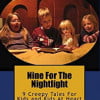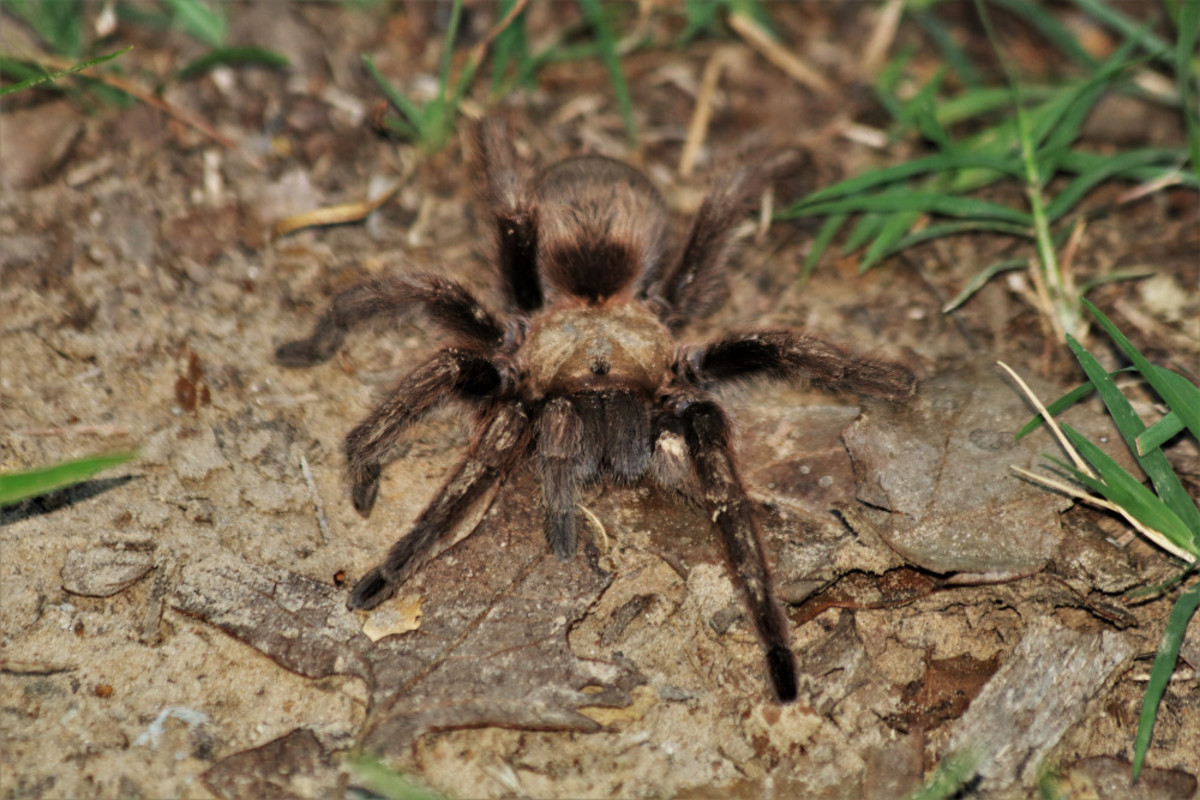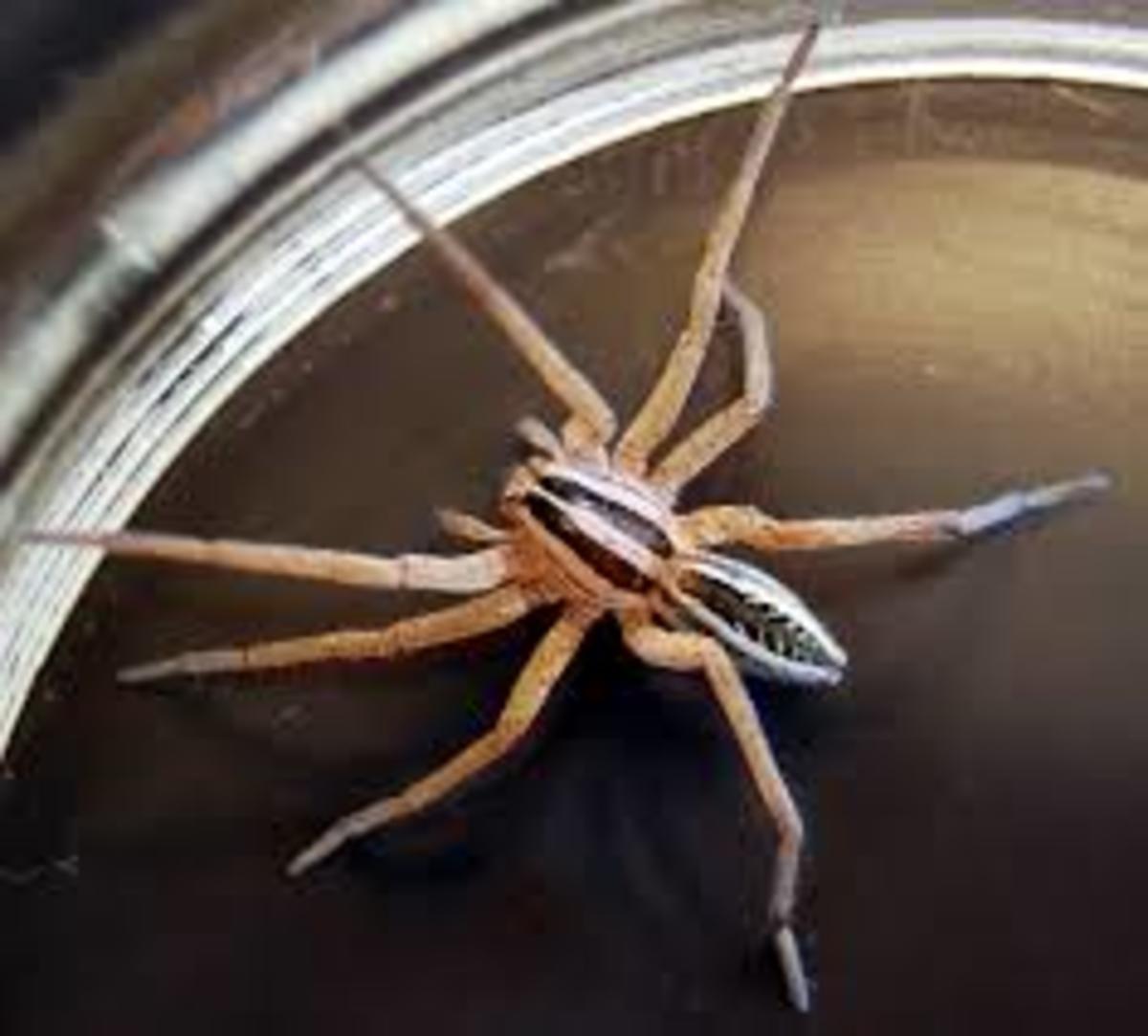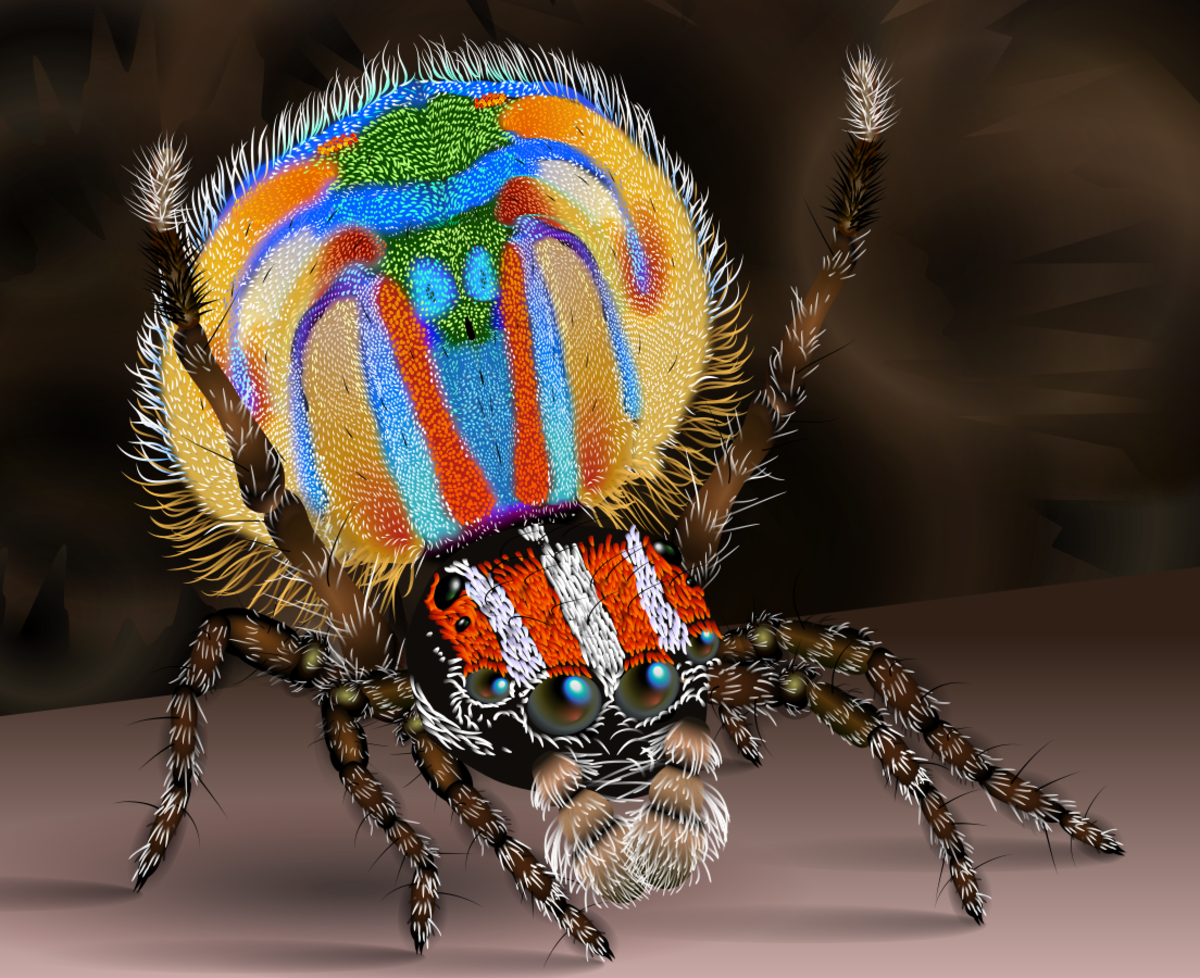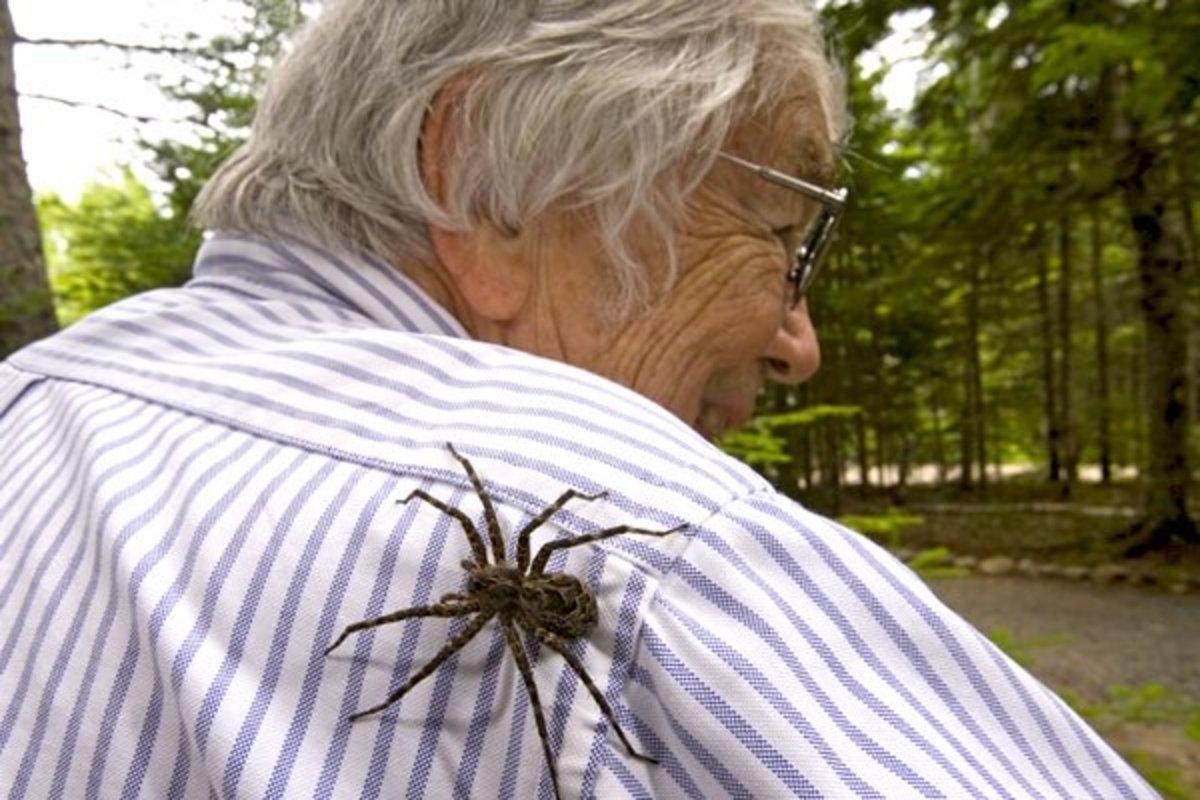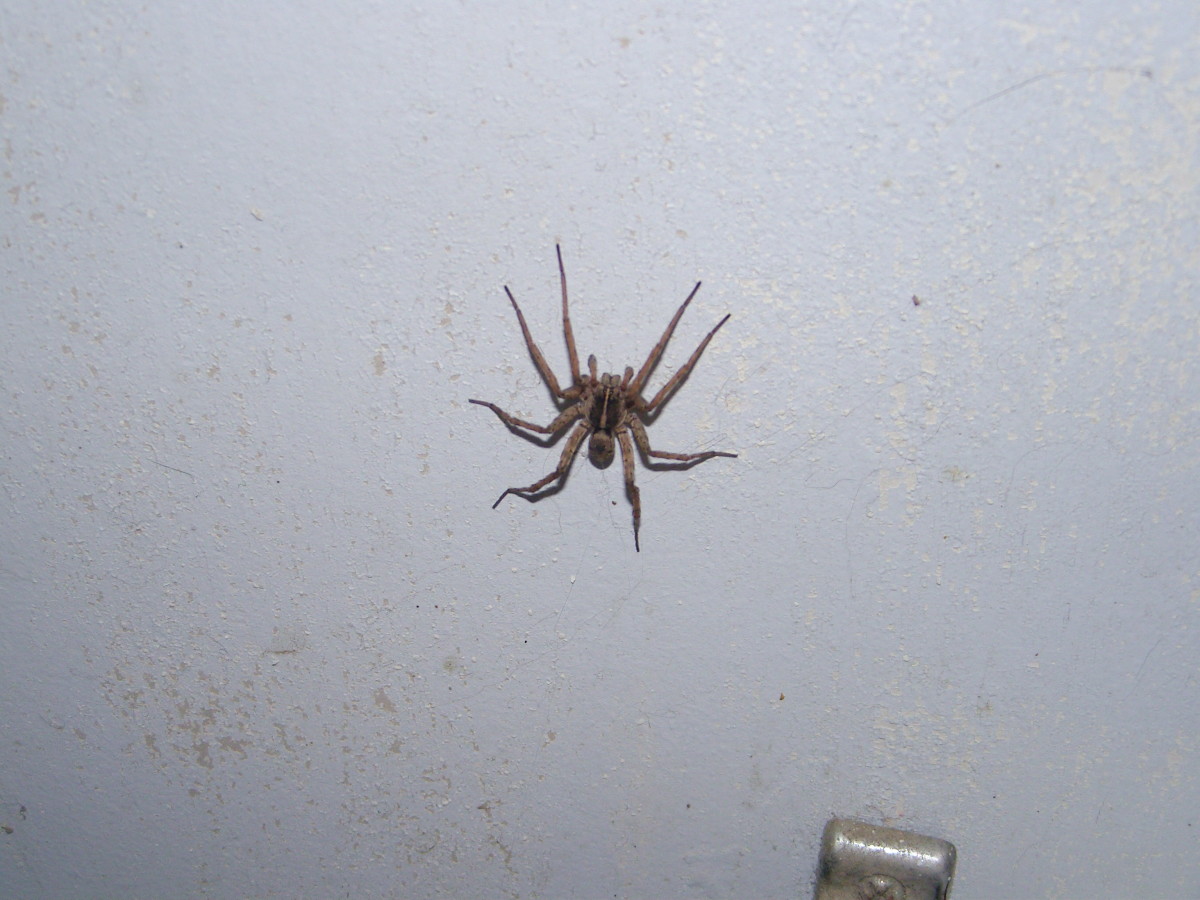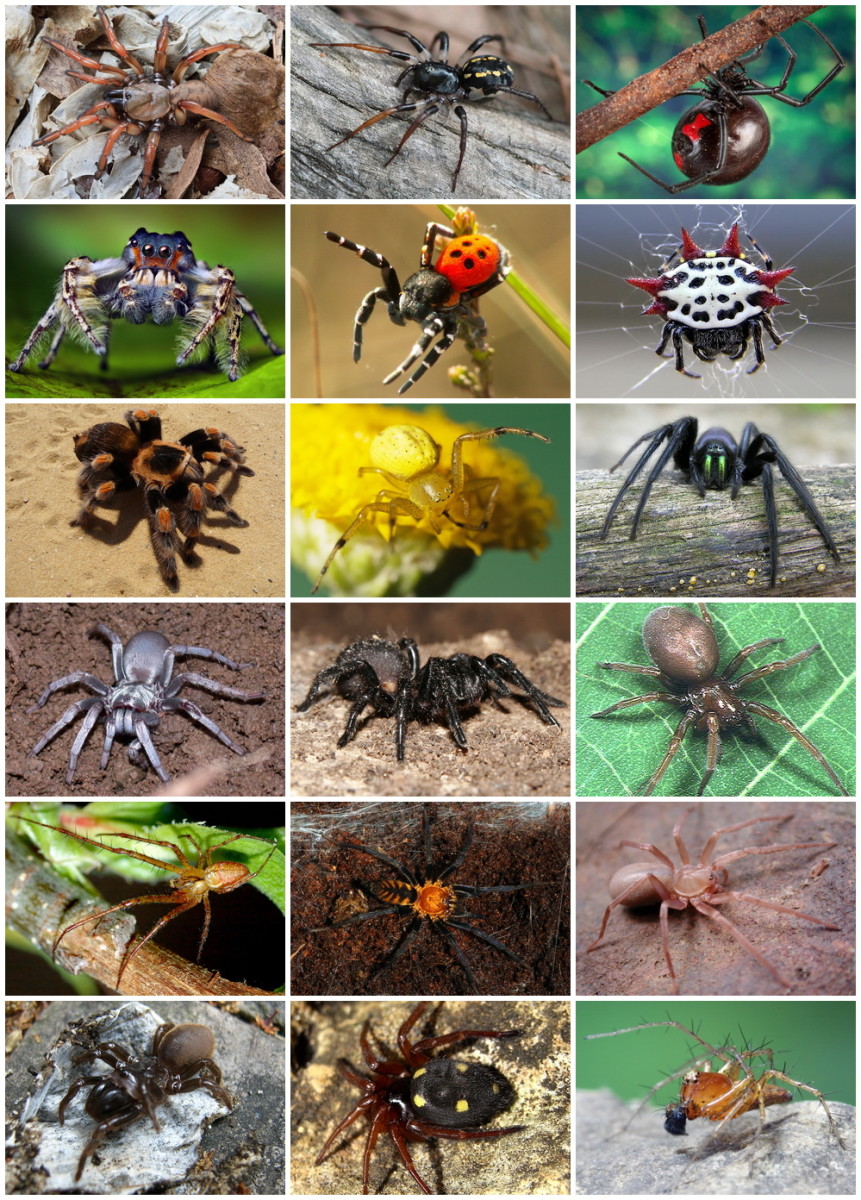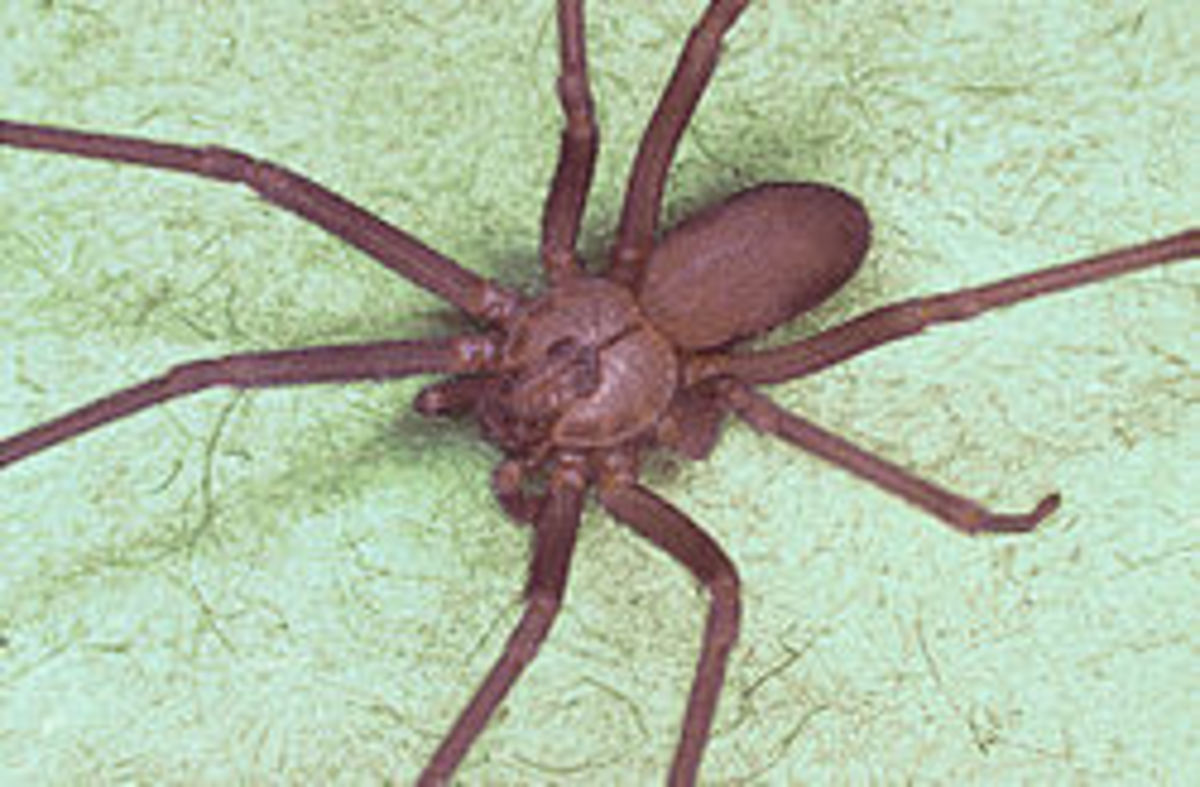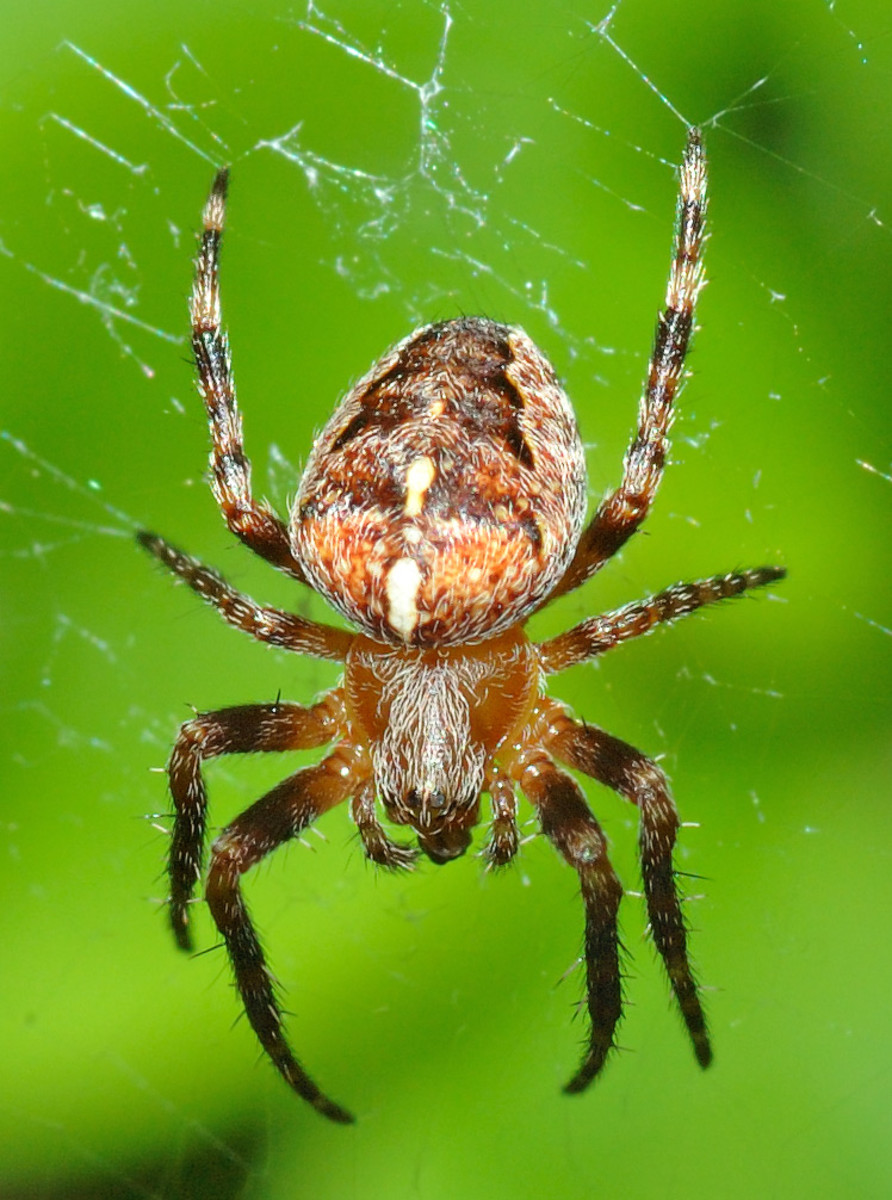- HubPages»
- Education and Science»
- Life Sciences»
- Entomology»
- Spiders & Arachnids
Spiders: The Biggest Myth About Them

I admit: I have suffered from a phobia of spiders practically all my life. The fear of these creatures developed young, due in great part to a couple of very unpleasant encounters with spiders. In my adulthood I’ve managed to cope with the phobia by purposefully forcing a transference of emotions - in other words, if I see a spider I get angry at it. Now anger may not work for everyone, but believe me, feeling po’d at something is much easier on the blood pressure than outright panic. Nonetheless, I still don’t like spiders. In fact it is my personal belief that if there is indeed true chaotic evil to be found on this planet (as opposed to the thinking evil so often indulged by human beings)- this chaotic evils resides in four forms: viruses, snakes, sharks and spiders.
Similarly if there is anything I find as useless to the world as spiders -oh don't get me started on their usefulness in nature, if they were performing that job we'd never hear of disease-carrying mosquitoes- it is in hearing that fictional ole adage, They’re more afraid of you than you are of them.
I don’t know what igit came up with this saying, but it is still often heard. My husband used to say it to me, though bless his heart, he’s real good about coming to the rescue whenever a spider crosses my path! But one night he came home from work and as he sat down in his favorite chair, gave a big exhale and told me that never, ever again would he say spiders are more afraid of us than we are of them. He went on to explain that while on duty (he’s a security guard) he noticed a large spider in the foyer of the motel he was assigned to. He said as he stood there the spider ran up to his foot and standing on its back legs (he’d never seen one do this!) the spider bit into the toe of his boot. So my darling shook it off, and wanting to get the thing safely outside (yes, for some ungodly reason he was concerned about the safety of that d*mned spider), he found a long pencil. Hoping the spider would crawl onto the pencil so he could carry it outside, he approached and held the pencil down for the spider to get onto. Instead, my husband was surprised to announce, the spider grasped the pencil end and sank its fangs into it. So holding the pencil with the angrily attached spider, hubby ran outside and put the pencil on the pavement. He said at once the darned thing let go of the pencil and charged at his foot again, biting the toe of the boot as before. As he couldn’t shake the thing off he eventually had to find grass and literally wipe the spider off. He returned to his post, but he thought about that stupid spider for the rest of his shift.
Now as much as I wanted to tell him, see I told you? I just couldn’t bring myself to stop laughing long enough to do it. But this wasn’t the first unpleasant encounter from other people I knew about, encounters that truly challenge that tired old adage about spiders being more scared, blah, blah, bu-lah. One of these I will share at the end of this article. But for now let’s just examine some other incidents in known history which not only challenge the adage, but may demonstrate why Mother Nature in her wisdom has instilled in humans a natural loathing for arachnids (at least for the sake of those not too arrogant to ignore it!):

Ti Piik Ur (Itzan nobleman)
This elderly ancestor of at least two Kan Ek’s (Itza Mayan kings), was celebrating his 123 birthday with friends and family when a horde of hairy white and brown spiders was reported to have entered through a window. The spiders startled guests, but the arachnids seemed uninterested in them, and instead scrambled up the legs, arms and back of Ti Piik Ur, biting him repeatedly in their frenzied attack. While the guests removed the spiders from the elderly man they discovered the arachnids disintegrated into “dark dust”, a substance that caused coughing and nose-bleeds among them all. Before nightfall Ti Piik Ur was dead, his body covered in large angry boils from the bites he had received. Coincidentally -and maybe not?- it was on the following day Spaniard conquistador Hernán Cortés and his expedition arrived to the lands of the Itzan.
Treva (The Beloved)
This mute daughter of Claudius Ptolemy was said to be the favorite child of the first century writer and scientist. Treva excelled in astrology under her father’s teaching and was also an artist, who often helped illustrate the maps he was famous for. At the age of fifteen Treva and some of her friends were taking a noon-time meal in her father’s study when the girl suddenly shuddered as if in pain. Moments later she fell unconscious and her distressed friends discovered what was described as a horrid red spider hidden in the girl’s hair and close to the scalp. After killing the spider the friends carried Treva to her bed. The girl never recovered consciousness and died almost forty-eight hours later. Ptolemy was devastated and asked a local sorceress to lay a curse on the spiders in his residence, that none should ever again find refuge or safety within his walls.

Zithyrs, the Rose-Headed (pagan martyr)
When Suleiman II and his soldiers invaded and captured Zithyrs’s home village in the Caucasus Mountains, every man and boy over the age of ten was brutally put to death and the women and girls taken as slaves. Zithyrs was only twelve years old at the time, but she never forgot nor forgave what the invaders had done. Because of her red hair (prized among Islamic slave traders) and her beauty, Zithyrs and her five-year old brother were claimed by Suleiman himself. Suleiman had the boy castrated and sent to be an apprentice to a tailor, and installed Zithrys into his harem.
Suleiman was said to have behaved like an awkward young virgin at the sight of this new addition, and promised to make Zithyrs his wife if she would deny her pagan gods and take up the Muslim faith. Zithrys told Suleiman that he would receive his answer on her next birthday. This was not good enough for Suleiman and after a few months he grew so impatient he threatened to kill the girl if she did not immediately reject her pagan beliefs. Zithyrs laughed at him and began singing in praise to the god of her home village. Enraged, Suleiman ordered for Zithyrs to be thrown into a pit of insects and scorpions.
When Zithyrs's body was removed from the pit, Suleiman saw that even as the girl was quite dead, no sign of any venomous bites marred her flawless beauty. Wanting one last gesture to prove his domination over even the most unyielding of infidels, Suleiman knelt and kissed the girl. At this moment a spider crawled out of Zithyrs's lips and entered the invader’s mouth. The startled Suleiman managed to swallow the spider but not before it bit the inside of his throat. Sometime after Zithyrs's murder, her brother -now a trained tailor- was summoned to work as dress maker for Suleiman’s harem. Suleiman, still ruffled by the girl's refusal to convert, boasted to the young eunuch of the day of her death and the details of how she was executed. The youth wept openly, and informed Suleiman that Zithyrs had indeed kept her word to him. When Suleiman asked what this meant, the youth explained that the day of his sister’s death was also her birthday. It was an answer that was said to have made Suleiman II tremble, as his throat had pained him ever since receiving the spider bite. This pain was to be his constant companion the rest of his life, along with the crusty, oozing sores that continually erupted over his lips - the same arrogant lips that had kissed the lifeless mouth of the courageous Zithyrs.
Doda, wife of Duke Godfrey III of Lorraine
Doda was widely regarded as a devoutly Christian woman, but also known for having a thick streak of cold cruelty toward anyone foolish enough to rouse her anger. Doda’s favorite revenge tactic was to place spiders in the beds of her enemies, especially those of young house maids who caught her husband’s roving eye. She also mocked her children if they showed any fear of spiders, and when one of her toddlers screamed at the sight of a spider, Doda sent the child to be raised in a horse stable and ordered he be fed nothing but water and hard bread. It was rumored that Doda raised her mercenary spiders herself, called them “God’s warriors” and even kept a priest on hand to give them confession. After her death, the numerous webs in her private chamber were found to have several human digits and at least one human eyeball encapsulated within the silk weaves, sewn into place with finest Italian lace and left, it was believed, as meals for Doda’s beloved arachnids. These horrifying remains were burned immediately, the webs swept down, the remaining spiders killed and the chamber sealed for five years before it was deemed safe to enter.
Little Brown Arthur (Ar’tur)
After the death of his favorite cup bearer, Elisedd ap Gwylog, king of Powys (in Wales) gave the position to the man’s six-year old son, Ar’tur. Known as Little Brown Arthur by courtiers, the king was very fond of the tender-hearted child. But the news of his position was made difficult to relate to the boy as Ar’tur had been raised by his mother who was a foreigner -with skin dark like clay and striking golden eyes, traits of which Ar’tur had inherited- and who had taught her son only the language of her own people. As this mother was also recently deceased, the king took it upon himself to have the boy trained in the duties by his 20-year old nephew, Lyrs of Tern. Lyrs, however, was extremely appalled by the idea of having to train this unusual-looking child, not to mention jealous that the king showered the boy with such affection.
One day the brooding Lyrs secretly dropped a spider into the wine cup Ar’tur was to bring the king. Elisedd had just taken the wine and was about to drink when little Ar’tur shouted out in the language he knew and grabbed the cup away from the king. The entire court was shocked and complained of the boy’s impertinence. Elisedd eyed Ar’tur with confusion, until the child suddenly reached for the king’s sleeve and removed the spider which had jumped out of the cup and onto his royal hand. The king was so pleased with his cupbearer that he rewarded the boy with the gift of his very own golden chalice and a parcel of land. Lyrs’ heart burnt with hatred for Ar’tur now. One night Lyrs entered the chamber where the boy slept on a rug and taking a cushion, smothered the child. Lyrs then carried little Ar’tur to the oven where the baker made the king’s bread and stuffed him inside. Two servants saw this act and went immediately to the chamberlain with the story. The king was awakened and informed, and he went with the company to the kitchen. They came upon Lyrs standing by the oven, wherein Ar’tur’s body was now set in flames.The king himself found a pail of water and doused the little boy’s body and removed it from the oven. Elisedd ordered the chamberlain and servants to have the small body prepared for burial. The land’s most renowned bards were called to sing and play the harps at the funeral. The three wisest Druids were asked to perform the holy rites. And the king’s youngest daughter brought the cream, the honey and the flowers to be set upon the stone rested at the head of Ar’tur’s grave.
Lyrs was subsequently placed in a cell in the king’s manor and threatened with torture if he did not confess all he knew surrounding Ar’tur’s demise. The royal nephew seemed oblivious to every attempt at intimidation. He staunchly refused to say anything about the matter except that he had come upon Ar’tur’s corpse roasting in the oven, and even insinuated that the crime must have been committed by the two servants. Elisedd, uncertain now of Lyrs’ guilt, was ready to set him free when the gaoler came to say the nephew had finally confessed to all his crimes. When the king arrived to the’ cell, Lyrs was gasping and tearful with dread, and told his uncle he would admit all his crimes if the gaoler would just remove the spiders that streamed forth from ever corner of the cell. Lyrs was brought to the shelter of his own room, and here confessed to his uncle all his transgressions against Ar’tur. Elisedd was so angry with his nephew that he told Lyrs to leave the court and the kingdom and to never show his face again. An armed escort waited outside Lyrs’ room to take him to the border, but when time passed and the nephew failed to come out, they entered. Here they found the remains of Lyrs, hardly recognizable for the hundreds of spiders that covered him like a burial shroud.
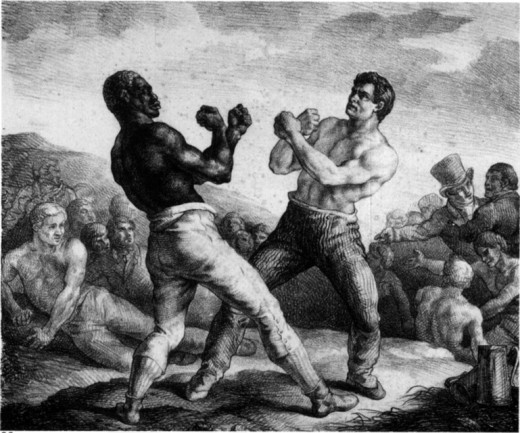
The sad end of the brave Doyce McKinnon
During the reign of Charles II Britain was abuzz over the story of a 27-year old Scot butcher and amateur boxer who had rescued eleven children after the hospice where they were at had been set ablaze by a strike of lightning. The king was so impressed that he sent McKinnon a most generous reward of jewels, flatware, an ermine coat, silver-laced slippers and over two hundred pearls. The Scot used the great part of this reward to open a boxing arena for local youths and in the rebuilding the hospice destroyed by the lightning.
Everyone seemed to like McKinnon, and for good reason: he was chivalrous, generous and in a time when religious disputes commonly turned vicious or worse, he opened his home to anyone, whether Catholic or Protestant or otherwise, who needed the warmth of a hearth or food in their stomach. McKinnon also went on to teach the sport of boxing to the royal sons of France and of Norway and even the forgotten princes of Ireland.
More than the once, McKinnon found his heroism called upon; such as the time he witnessed a pretty native captive from the Americas treated with much abuse by local mercenary sailors. McKinnon challenged them all with his fists, and having beaten and shamed the offenders, claimed the girl (he called Virginia) to be his ward and took her to his home. There the girl was treated well and he employed her to be his cook and built onto his humble house another room that she could call her own. A year later McKinnon proposed and the two were married.
McKinnon’s reputation did not end with this chivalrous act. In his early thirties, while visiting Wales, he rescued a young boy who had fallen into a deep narrow crevice. At the age of thirty-six, while walking home one night, he heard screams from a neighbor’s home; concerned, McKinnon entered the home and interrupted (and severely beat) two rogues trying to ravish his neighbor’s wife. A year or so afterward, McKinnon saved an elderly couple by pushing them out of the way of a runaway horse and cart. And some months later, armed with only a pitchfork, he drove off rustlers whom he’d spied trying to carry off sheep from his neighbors’ property.
Despite his selfless heroism, it was known to close associates that Doyce McKinnon suffered from a crippling fear of spiders. One summer afternoon in his fortieth year, he stood with some friends while watching two of his pupils practicing at the mat. McKinnon was sweating from the heat and accepted from one of his companions a handkerchief to wipe his brow. As he went to blot his forehead, McKinnon noticed a spider dangling by a thread from the cloth. With a gasp he threw the handkerchief down. Witnesses say McKinnon’s face turned purple and he grabbed his chest; moments later he fell dead to the ground. The companion who had offered the handkerchief blamed himself for McKinnon’s demise, and provided for McKinnon’s widow the rest of his life.
It was estimated that almost four hundred and twenty-five persons attended the funeral of Doyce McKinnon, among these a special envoy from the court of France, a handful of his aristocratic students from Norway, an English ambassador and every one of the now-adult children he had saved from the hospice fire.
Whiskey Joe’s last smoke
Pre-vaudeville entertainer John “Whiskey Joe” Williams and his wife “Joy Joy” were known for a popular comedy and dance routine performed in venues across North America, Canada, Australia and the UK. In the winter of 1889 the couple attended a New Years Eve party given by a friend at Goat Island (NY). As the guests waited for the clock to strike midnight, Whiskey Joe was offered a cigar by another guest. No one noticed he had stopped puffing until after the new year was declared and his wife turned for a kiss. She found him struggling to breathe and unable to speak. It was thought the entertainer was choking, and attempts by a doctor on hand did not help. Whiskey Joe succumbed in less than half an hour. The physician that performed a post-mortem examination discovered Whiskey Joe had choked to death on an egg clutch of baby spiders. It was concluded the clutch had somehow wound up in the cigar Whiskey Joe had received. No charges were pressed.
The unfortunate out-of-towners
On a Friday afternoon In 1926 in the city of Kingsport, TN an out-of-town couple walked into the Lucky Fountain hotel. They were young and very affectionate with one another, and signed the registry as Mr. And Mrs. Andrew Smith. Although the registry clerk suspected this was a false name, he didn’t want to stand in the way of love and let them take the hotel’s only suite. Mr. Smith paid in advance through Monday morning and ordered breakfast and dinner for each day of their stay. While walking to their suite Mrs. Smith informed the clerk’s baggage carrier that she and her husband were from a small town in Minnesota and had come to Tennessee to attend the wedding of friends that was to take place on Sunday.
On Saturday morning, when the kitchen boy arrived with their breakfast, the couple did not answer to his knocks. The young man left the cart with their food outside the door, and returned around noon to find that neither the cart nor the trays had not been touched. The kitchen boy returned the cart and trays to the kitchen. Later, as he had been instructed to deliver the ordered dinner, he returned with the cart and supper food, but once more the couple did not respond to his knocks. Concerned now, the kitchen boy reported this to the clerk. The clerk went to the suite door and knocked politely. Receiving no answer, he hailed Mr. Smith by name and asked if the couple were alright? He received no reply from inside. The clerk decided the couple had gone out with their wedding party friends and would be back at their own determined time.
On Sunday morning the kitchen boy came again with the cart and the ordered breakfast. Again, he received no answer to his knocks. He left the cart where he had before and returned around noon to find it still there, and the food untouched as before. The boy informed the clerk of this, who told him they would wait and see what transpired after the dinner was brought that evening. But once more there was no response from the couple. When the dinner food had been sitting on the cart for over an hour the clerk walked to the house of the hotel owner. They both returned to the Lucky Fountain, took turns knocking and hailing for Mr. and Mrs. Smith. After several minutes of waiting, the owner had the clerk fetch the skeleton key and open the door. As they entered the suite the men were shocked to find the couple in bed, seemingly asleep and enfolded in one another’s arms, but both very pale of color. The owner pulled aside the sheet and blanket, and the men saw that the couple’s torsos and legs were dotted with numerous cruel and bloody bites. Authorities were called in, and these officers further discovered dozens of black widows residing in the frame boards of the honeymoon bed. The city coroner quickly determined the couple had been dead since late Friday night, killed in their sleep by the venomous creatures.
In an interesting side-note to this story, the Kingsport police put out notice to local newspapers and a radio station of the couple’s passing in order that relatives or friends could claim their bodies. After some weeks and no one had came forth, Kingsport police contacted Minnesota officials about the matter. However, no persons matching the couple’s descriptions or the names they had registered with were reported in that state. As the couple had given the motel clerk no home address and had no identification besides the names they provided in the registry- not even a vehicle bearing Minnesota tags were to be found in Kingsport- no family members of the unfortunate Andrew Smith and wife were ever located.

Assault victim UNV-1596
During the 1980’s phobia “treatments” were very popular among mental health practitioners, particularly among those with more ambition than common sense. Successfully convincing the public one could remedy the emotional suffering and stigma associated with phobias promised the most lucrative of possibilities: there was fame and big money to be made through books, through lecture tours, through television appearances. A routine feature of these trendy treatments was the introduction of the patient to the object of their phobia or the situation that set a phobia off. These introductions were generally recommended to be done gradually, the belief espoused by supporting mental health practitioners being that after repeated confrontation of the feared object or situation, the sufferer’s anxiety level would naturally reduce. After awhile, the theory reckoned, the patient would find themselves capable of spending more and more time with the dreaded object or situation and in time find themselves cured of their anxiety altogether!
In 1982, parents of an American teenage girl sought out the help of one of these phobia gurus, a psychiatrist in fact, who claimed to be able to dismantle any phobia known to man. The couple’s daughter was deathly afraid of spiders and this caused great embarrassment for the mother, who was known to boast that she herself didn’t fear anything, especially not a mere insect. So she offered this lauded “expert” several hundred dollars for him to carry out his treatment on her daughter.
The psychiatrist came to the house regularly, bringing along during visits a tarantula which he claimed to have successfully helped him treat many other phobia sufferers. For seven days the tarantula was brought for an hour into the family den where the girl was seated. For these seven days the girl could see the tarantula inside his glass case with the vented but firmly closed lid. The next week, the tarantula was not only brought into the room, the daughter was coaxed over and over to touch it. The psychiatrist even removed the tarantula from the cage and showed his patient how very little she had to fear.
When at the end of the third week the girl had still refused to touch the creature, her mother threatened to cancel the last generous cheque she’d wrote to the good doctor and kick her daughter out of the home. Not wishing to be forced to look for a new gig so soon, the psychiatrist conceived a brilliant plan he was sure would force his patient into cooperation.
So he came by again, and explaining his plan to the mother, convinced the woman to give him one more try. If he succeeded the mother agreed to give him a five hundred dollar bonus and to recommend his services to others. So the girl was called down by the mother and told to go into the den, where the psychiatrist waited. Here, the doctor gave her a drink laced with a strong sedative. Once the girl was feeling the effects and unable to defend herself, he tied her to the chair with nylon cords. Now the psychiatrist unveiled his tarantula, which on this day he had kept in a glass cage hidden inside a storage compartment of an end table. As the sedated girl watched this experienced and allegedly professional mental health practitioner bring the tarantula out of the cage and carry it toward her, she did what came most natural: she screamed.
This did not deter the psychiatrist, oh no, and he proceeded to tell the girl that there was nothing to fear and scolded her for her terror. I’m holding it, he said, and it isn’t hurting me, so why would it hurt you? Only a coward or someone looking for attention would show such a reaction!
It was about thirty minutes later when police arrived to the home. They had been alerted by neighbors who had heard the girl’s terrified screams. She was still screaming when the officers knocked on the front door. When the mother refused to let them in, the officers pushed her aside and found the girl’s father, looking pale and at a loss of words in the foyer. He pointed them down a hallway and toward the door of the den. Here, the officers found the screaming child still tied in the chair. On the floor nearby was the phobia expert. He was still alive, but having difficulty breathing, his heartbeat was erratic and he was unable to respond to their questions. Now the officers took notice of the bound girl. They saw the tarantula - it had made its way to her and was crawling up her blouse. One of the officers slapped the creature off and ended its threatening presence by dropping on top of it the glass cage it had been brought in.
The psychiatrist spent the next few days in the hospital. Except for losing the sight in his left eye from the stroke and the damaged skin from where the tarantula had bitten, his recovery was successful. Before his psychiatry license could even be held up for review by the State board of medical examiners, he decided to move to another state altogether and obtain a minister’s degree. In time he landed a new job heading up one of those Tough Love camps for “problem children and teens”. He was terminated soon enough however, after one of his wards hung himself, having cited in his suicide letter that the “reverend” in charge had forced him to drink urine. The former psychiatrist turned disgraced minister eluded prosecution, and was last reported to have been spotted in New Zealand.
The spider-phobic girl’s mother told investigating officers and social workers that she was ashamed to have a coward like her daughter. The father later divorced his wife and took custody of their two other children. Assault victim UNV-1596, as she became known in their town, sought and found aid from a public attorney, and with his help was legally emancipated two months after the tarantula ordeal. She has since changed her name and has gone on to get her degree as a child psychologist. Today she devotes her life to helping and treating juvenile victims of the mental health industry. She is not ashamed to say that she is still afraid of spiders. But, she says, there is, “even more to fear from the vanity of those that weave human webs”.
Not just people!

The death of the great Trumpet
Fondly called Trumpet because of his resounding whicker, he was the favorite war horse of Germanicus, the popular Roman general and heir-designate to the Roman Empire. A tall, strong-limbed dapple with a mane said to be so white it shone blue under the sun, Trumpet had proven his worth to Germanicus as much as any trained legionnaire. The general credited his steed with having saved his life more than twenty times twenty, during campaigns and even off. Trumpet had once leaped through a tower of burning trees in order to reach his fallen master, and stayed by the side of the wounded man until he was able to mount the saddle. Another time Trumpet chased off a full grown and angry male bear that was walking around the soldiers’ camp while most were sleeping. But perhaps the steed’s most praised deed was when he killed a viper that had fallen from a rock wall onto the shoulders of the general’s young son Drusus (later Caesar). Trumpet snagged the serpent between his teeth, flung its head against the wall so that it was dazed, then stomped the serpent until it lay dead.
Thus it came as no small shock to Germanicus when he was alerted one morning that Trumpet had gone mad with terror in his stall. At once the general raced to the stable, where the keepers were doing their best to soothe the horse from whatever panicked him. The great animal was literally trying to crawl up the walls, and screaming in that terrifying voice only frightened horses can elicit. Despite Germanicus’s attempts to reassure Trumpet and call him forth as he had hundreds of times before, the great steed would not venture out the gate. Germanicus started into the stall, when he suddenly saw on the threshold a great spider of sickly beige color. The creature was standing on its four hind-most legs and rearing its fangs at Trumpet. Germanicus kicked the beast away, only to see several more similar spiders crawling around in the hay on the ground. As the stable keepers hastened to kill these, Germanicus searched for something to use as a hood that he might lead the horse calmly outside. Suddenly he heard Trumpet scream again, and as he turned saw the horse dash its head against the stone wall in the rear of the stall. So powerful was this blow that the horse’s skull was crushed. The beloved Trumpet died within minutes.
The legion gave Trumpet a funeral fit for a king. Later, Germanicus had his faithful companion’s ashes sent to Rome, where the priests of Jupiter turned them into incense that was burned with great honor in the god’s temple. And it was said in Rome that day the children Elysium now led to graze the most noble horse that ever graced the company of mankind.
A dissection discovery
In 1917 high school science teacher T.R. Reynolds of Kansas was enjoying his Saturday morning with a cup of tea and a book when one of his students came to the door. The boy had brought a dead jumping spider, explaining his cat had killed the spider in his mother’s sewing room, and as it was exceptionally large and the mother wanted it removed at once, he thought Reynolds would enjoy dissecting it. The two went into Reynold’s home lab and in a light mood, geared up for the exercise in scientific dismemberment. But upon slicing the arachnid the two were amazed to discover that its stomach contained the partially digested foot and ear of a kitten. These grisly remains were sent to the state science laboratory, which months later confirmed to Reynolds that the spider had eaten the kitten alive and without dissolving it first with acidic fluids as is natural for arachnids.

For the sake of a turtle
After the second Battle of Guam in WWII, two American marines stationed on the island were patrolling a moonlit beach when they saw a beached sea turtle just some yards ahead. The animal was in apparent distress and as the marines approached they saw the cause of this distress - a sea spider of immense proportions had attached itself over the face and nostrils of the turtle in what the marines later described as “a death grip”. Although the servicemen were supposed to be searching for loyalist Japanese snipers known to be hiding in the jungle, the marines decided to take a pause and help the turtle. The spider proved a determined one, however, and despite the efforts of both men, they could not dislodge it, and they dared not stab it with their knives lest the turtle be hurt. They labored for some time with the stubborn spider, so long they didn’t realize dawn had come until they heard voices from the jungle behind them. Looking, they saw three armed Japanese soldiers step out of the shadows onto the beach. As the marines remembered their mission they grabbed for their weapons, but the Japanese threw up their palms as if gesturing they meant no harm. Although it went against all reason, the marines said that for some inexplicable reason they knew they were in no danger. The Japanese in fact helped in the effort to wrench the spider from the turtle and throw it to the sand. After one marine stabbed the monstrous arachnid, the five of them treated the turtle’s facial injuries with first-aid cream one of the Japanese had brought along. They then watched as the turtle made the trek back to the ocean and slipped under the waves. The two marines and three Japanese soldiers eyed one another for several moments, then exchanging respectful nods and smiles, went their separate ways. The marines understandably did not report the incident to their superiors, nor were the three specific Japanese they met that early morning ever sighted again.
That experience I promised to share:
When I was a kid I had a good friend, “Elaine”. Now Elaine was a bright girl, though perhaps not quite as bright as she liked to believe. Elaine was fascinated by spiders, and caught them whenever she could. She’d make a comfortable jar, vent the lid with holes, fill the jar with grass or sticks, drop a captured cricket or fly inside, then go out to trap one of her little crawly friends. She then brought them into her room, and keep them there for a few days at a time before setting them free once again. Elaine’s favorite spiders were black widows -which she thought were beautiful- and when her mother caught her bringing one of these into the house, oh there was heck to pay that night! Anyway, for all Elaine’s attempts to get me to cozy up to her spiders buddies, there was just no way. And Elaine would try to shame me, using that same old tired adage I’d heard from other spiderophiles.
Elaine lived close to a boy, a couple of years younger than us, whom I’ll call “Buddy”. Buddy wasn’t the most brilliant kid in the world, and he seemed to go out of his way to do stupid things to impress others. Once, Buddy had broken both legs jumping off the water tower - all thanks to Elaine, who had dared him to jump. Another time Buddy decided to take us all for a ride in his father’s jeep (mind you, he was twelve years old). We weren’t as daring as Buddy and declined the offer; but we heard about the ride later that day as it was described over the six-o’clock news. (Nobody died, but the jeep was totaled. The sign Buddy hit only got a dent). Like I said, not the most brilliant kid in the world.
I had gone over to spend a night at Elaine’s house, and we’d been invited over to Buddy’s house. His parents were both at work and his teen sister away with her friends. Buddy had raided his father’s liquor cabinet and we had plenty of snacks and music and it was looking to be one memorably nice -though foolishly spent- evening for half a dozen middle-school kids. But soon after we got there, I discovered Buddy vomiting on the stairs. He was very pale, too, and his face bloated, his skin dripping with perspiration. Buddy told me he hadn’t felt well since the previous day when he got bit on the finger by a spider he was helping Elaine catch. He showed me the finger, it was the forefinger of his strong hand, and it was swollen and had turned an ugly shade of gray with festering purple spots here and there. I called for the others and we were leading Buddy to the couch when he fainted. So we found his mom’s work number taped to the fridge and gave her a call. She came straight home and we loaded Buddy into the back of her station wagon. All of us kids poured in, too, and the mom sped off to the emergency room.
Awhile after Buddy had been admitted the attending physician appeared in the waiting room where we kids sat with Buddy’s mom. The doctor had a grim bearing as he looked us over. Finally he asked, “Which one of you kids is Elaine?”
Elaine raised her hand and the doctor came over. “Did you tell this twelve year old boy that a black widow won’t bite if you talk to them in a reassuring voice?”
Elaine nodded but I noticed the red blooming into her cheeks.
The doctor said with a humorless smile, “Then it should be you in there getting prepped for surgery instead of your friend.”
Elaine tried to defend herself by saying in her most reasonable voice that spiders have more to fear from people than vice versa.
The doctor made a groan and told her, “Young lady, I may know one idiot who would believe you on that and he’s about to have a finger removed.”
©2017 by Beth Perry
